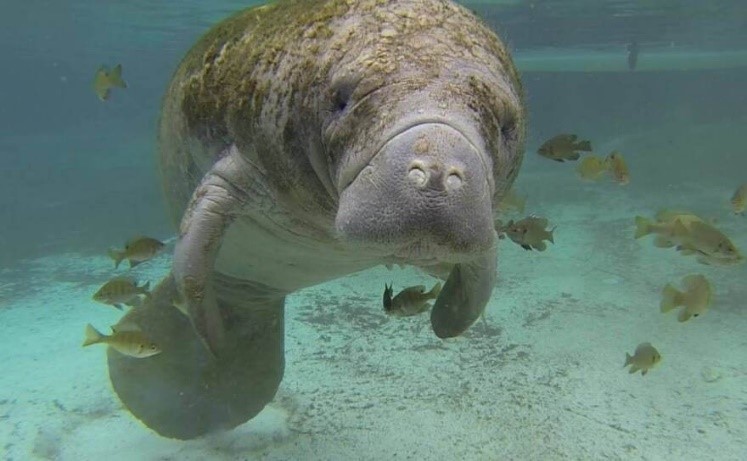Negative Effects of Common Weed Killer on Manatee Immune System
Negative Effects of Common Weed Killer on Manatee Immune System
by Steven Madore, PhD; (Summarized from www.sciencedirect.com)
Glyphosate is the herbicide used globally for agricultural and non-agricultural purposes to treat a broad spectrum of weeds. In Florida, this chemical is used in agriculture and to control the growth of invasive aquatic plants in lakes and rivers. It is also used widely for non-agricultural purposes on sidewalks, parks, and private homes to kill weeds. Glyphosate can be found year-round in freshwater with higher concentrations in the water in South Florida close to agricultural areas compared to a natural spring area.
aquatic plants in lakes and rivers. It is also used widely for non-agricultural purposes on sidewalks, parks, and private homes to kill weeds. Glyphosate can be found year-round in freshwater with higher concentrations in the water in South Florida close to agricultural areas compared to a natural spring area.
Florida manatees (Trichechus manatus latirostris) can be more exposed to contaminants than other marine mammals due to their extensive use of marine and freshwater environments and their proximity to human activities. Manatees can be exposed when drinking fresh water to glyphosate that is continually present in many freshwater environments, and since glyphosate can accumulate in plants, exposure can also occur through ingestion of aquatic vegetation. Glyphosate exposure is most associated with renal and hepatic toxicity in animal models. A recent study from University of Florida scientists supported by the ICBR Next Generation Sequencing Core shows that glyphosate can affect the immune system of manatees. This study was led by Dr. Maite De Maria, a postdoctoral researcher in the UF Department of Physiological Sciences, in collaboration with Professor Dr. Nancy Denslow, UF Professor of Environmental Toxicology. This study used ICBR transcriptomics expertise to show that glyphosate exposure in manatees promotes expression of genes associated with acute-phase inflammation and inhibition of the T-lymphocyte proliferation pathway. T-lymphocytes are a type of white blood cell that acts protectively within the body, patrolling the bloodstream for harmful invaders such as bacteria, viruses, or other pathogens, and acting defensively to fight infection. The researchers found that glyphosate exposure in-vitro can reduce immune T-cell division by more than 27.3%, potentially compromising the threatened species’ ability to fend off disease. Exposure to this contaminant along with other environmental stressors, such as extreme winters and red tide, might further affect the adaptive immune response of this threatened species. These findings are of greater significance in the context of a threatened marine mammal species that is at risk of exposure to various environmental stressors, such as red tide, extreme winters, or starvation, that impact their immune system and can be exacerbated by climate change. These stressors, along with glyphosate exposure, may result in cumulative immunosuppressive effects, thus decreasing manatees’ capacity to respond to toxins, pathogens, and disease.
“Our research raises important questions about how chemical exposure might influence immune function,” said lead author Maite De Maria, Ph.D., a postdoctoral researcher who supports the U.S. Geological Survey in collaboration with the Center for Environmental and Human Toxicology at the UF College of Veterinary Medicine.


